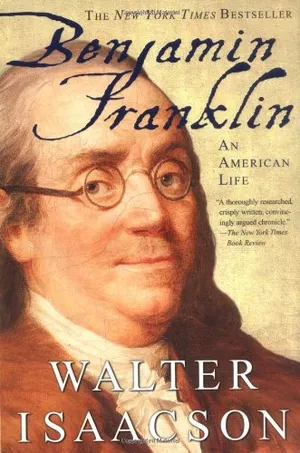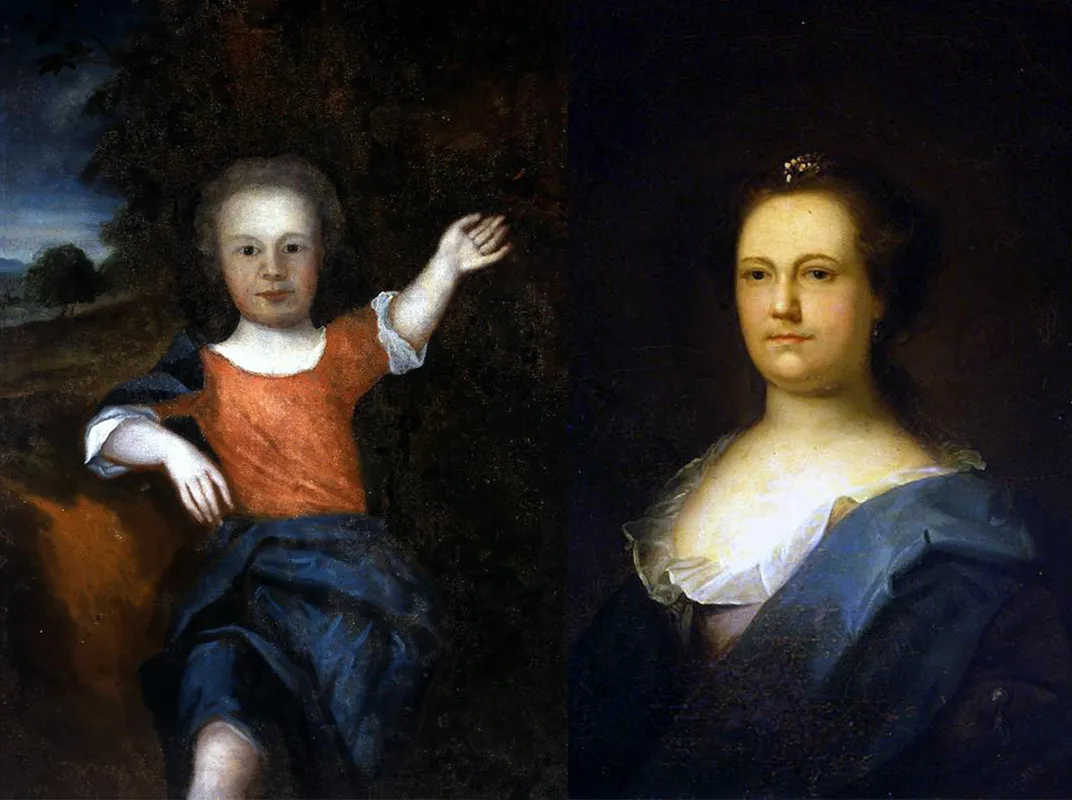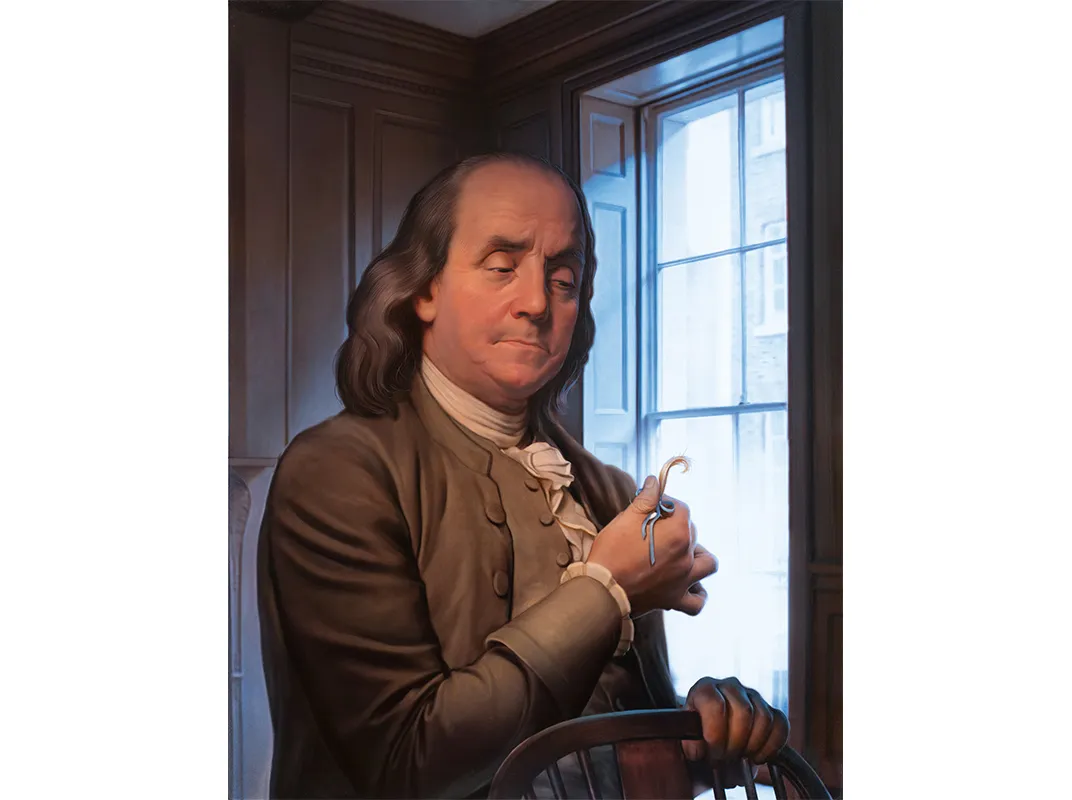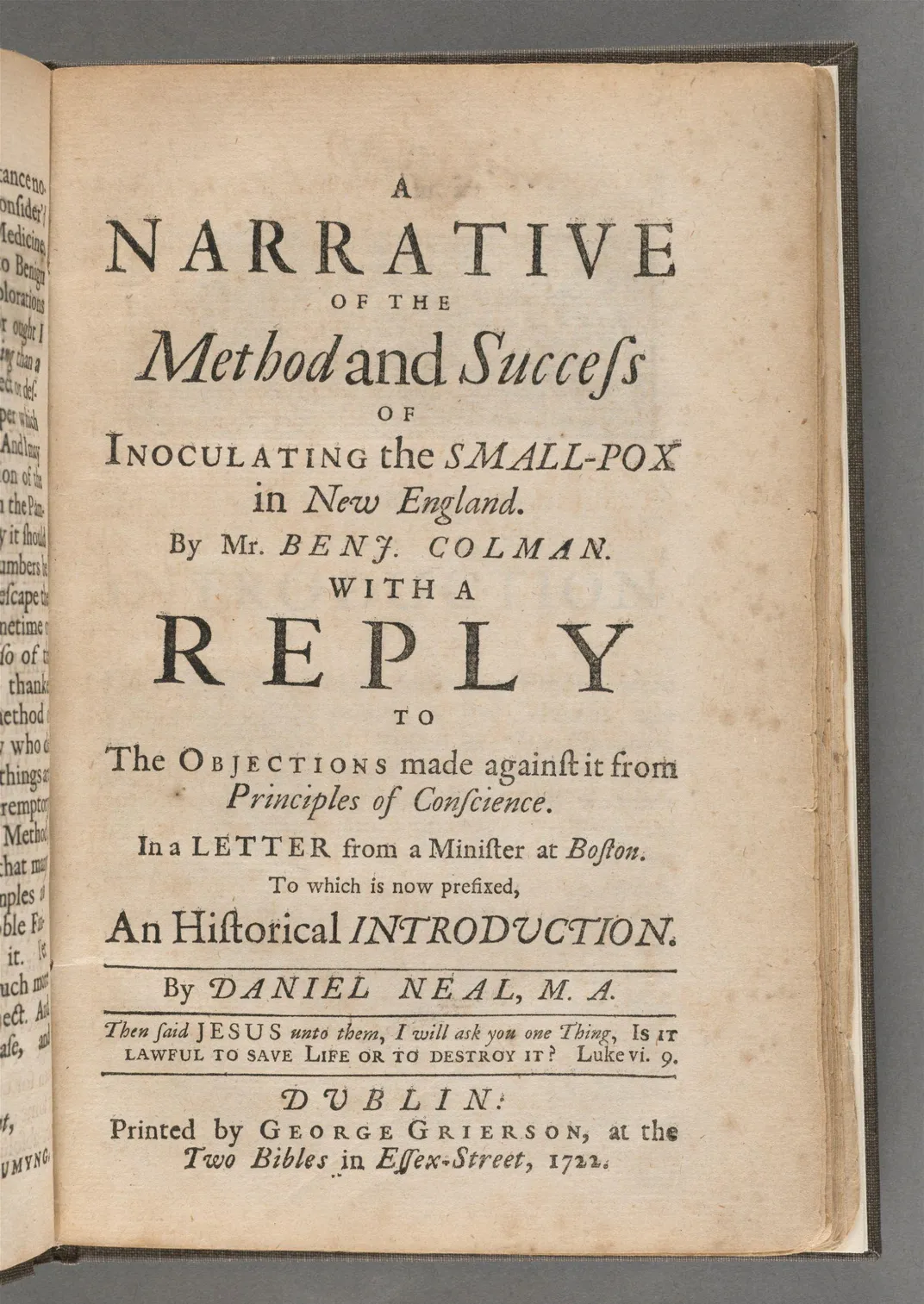Try That Again Bodman Franklin
/https://tf-cmsv2-smithsonianmag-media.s3.amazonaws.com/filer/53/f9/53f9e9d8-ff1a-4164-a686-ce595ec2cad2/sep2017_h03_benfranklin-wr.jpg)
In Oct 1765, Deborah Franklin sent a gushing letter to her husband, who was in London on business for the Pennsylvania legislature. "I have been and then happy equally to receive several of your honey letters inside these few days," she began, calculation that she had read one letter "over and over." "I call it a married man'due south Love letter," she wrote, thrilled as though it were her first experience with anything of the kind.
Maybe it was. Over 35 years of wedlock, Benjamin Franklin had indirectly praised Deborah's work ethic and common sense through "wife" characters in his Pennsylvania Gazette and Poor Richard'due south Almanac. He had celebrated her faithfulness, pity and competency as a housekeeper and hostess in a verse titled "I Sing My Plain State Joan." But he seems never to have written her an unabashed expression of romantic love. Whether the letter in question truly qualified equally his starting time is unknown, since information technology has been lost. Simply it's likely that Deborah exaggerated the letter's romantic aspects considering she wanted to believe her hubby loved her and would return to her.
That February Franklin, newly arrived in London, had predicted that he would be home in "a few Months." But at present he had been gone for xi, with no word on when he would come back. Deborah could tell herself that a human who would write such a letter of the alphabet would non repeat his previous sojourn in England, which had begun in 1757 with a promise to be dwelling house before long and dragged on for five years, during which rumors filtered back to Philadelphia that he was enjoying the company of other women. (Franklin denied it, writing he would "do zilch unworthy the Character of an honest Human, and one that loves his Family.") But equally calendar month afterward month passed with no word on Benjamin's voyage home, it became clear that history was repeating itself.
This time Franklin would be gone for ten years, teasing his imminent return near every spring or summer and then canceling at most the last infinitesimal and without explanation. Twelvemonth subsequently year Deborah stoically endured the snubbing, even after she had a stroke in early bound 1769. Just as her health declined, she gave upwardly her vow non to give him "one moment's trouble." "When volition it be in your power to come habitation?" she asked in August 1770. A few months subsequently she pressed him: "I hope you volition not stay longer than this fall."
He ignored her appeals until July 1771, when he wrote her: "I purpose it [his render] firmly after ane Winter more here." The following summer he canceled once again. In March and April 1773 he wrote vaguely of coming home, and then in October he trotted out what had become his stock excuse, that winter passage was likewise dangerous. In February 1774, Benjamin wrote that he hoped to render dwelling house in May. In April and July he assured her he would sail soon. Simply he never came. Deborah Franklin suffered another stroke on December 14, 1774, and died five days after.
We tend to idealize our founding fathers. So what should we brand of Benjamin Franklin? One pop image is that he was a free and easy libertine—our founding playboy. But he was married for 44 years. Biographers and historians tend to shy away from his married life, perhaps considering it defies idealization. John and Abigail Adams had a storybook spousal relationship that spanned half a century. Benjamin and Deborah Franklin spent all only two of their terminal 17 years apart. Why?
The conventional wisdom is that their marriage was doomed from the beginning, by differences in intellect and ambition, and by its emphasis on practicality over love; Franklin was a genius and needed liberty from conventional constraints; Deborah's fear of bounding main travel kept her from joining her husband in England and made it inevitable that they would drift apart. Those things are true—up to a betoken. Merely staying away for a decade, dissembling year after year nearly his return, and and so refusing to come home even when he knew his wife was failing and might presently dice, suggests something beyond bored indifference.

Benjamin Franklin: An American Life
In this colorful and intimate narrative, Isaacson provides the full sweep of Franklin's amazing life, showing how he helped to forge the American national identity and why he has a particular resonance in the twenty-first century.
Franklin was a great man—scientist, publisher, political theorist, diplomat. Just we can't empathize him fully without considering why he treated his married woman so shabbily at the end of her life. The answer isn't unproblematic. Just a close reading of Franklin'southward letters and published works, and a re-examination of events surrounding his marriage, suggests a new and eerily resonant explanation. It involves their only son, a lethal disease and a disagreement over inoculation.
**********
As every reader of Franklin's Autobiography knows, Deborah Read first laid eyes on Benjamin Franklin the day he arrived in Philadelphia, in Oct 1723, after running away from a printer'south apprenticeship with his brother in Boston. Fifteen-yr-old Deborah, standing at the door of her family's firm on Market Street, laughed at the "awkward ridiculous Advent" of the decrepit 17-year-old stranger trudging down the street with a loaf of staff of life under each arm and his pockets jutting with socks and shirts. Merely a few weeks after, the stranger became a boarder in the Read dwelling. After half dozen months, he and the young woman were in love.
Meanwhile, Pennsylvania's governor, William Keith, happened upon a letter of the alphabet Franklin had written and decided he was "a young Man of promising Parts"—so promising that he offered to front the money for Franklin to ready up his own printing house and promised to send plenty of work his manner. Keith's motives may have been more political than paternal, but with that, the couple "interchang'd some Promises," in Franklin's telling, and he prepare out for London. His intention was to buy a printing press and blazon and return equally quickly as possible. Information technology was November 1724.
Nothing went every bit planned. In London, Franklin discovered that the governor had lied to him. There was no money waiting, non for equipment, not even for his return passage. Stranded, he wrote Deborah a single letter of the alphabet, maxim he would be away indefinitely. He would later admit that "by degrees" he forgot "my engagements with Miss Read." In declaring this a "great Erratum" of his life, he took responsibility for Deborah's ill-fated matrimony to a potter named John Rogers.
Only the facts are more complicated. Benjamin must have suspected that when Sarah Read, Deborah's widowed mother, learned that he had neither a press nor guaranteed work, she would seek another suitor for her girl. Mrs. Read did precisely that, afterwards albeit to Franklin, equally he wrote, that she had "persuaded the other Match in my Absence." She had been quick almost it, too; Franklin's alphabetic character reached Deborah in late spring 1725, and she was married by late summer. Benjamin, also, had been jilted.
Just weeks into Deborah's marriage, give-and-take reached Philadelphia that Rogers had another wife in England. Deborah left him and moved dorsum in with her mother. Rogers squandered Deborah's dowry and racked up big debts before disappearing. And yet she remained legally married to him; a woman could "self-divorce," as Deborah had done in returning to her mother's home, simply she could not remarry with church sanction. At some point she was told that Rogers had died in the West Indies, but proving his expiry—which would have freed Deborah to remarry formally—was impractically expensive and a long shot besides.
Franklin returned to Philadelphia in October 1726. In the Autobiography he wrote that he "should have been...asham'd at seeing Miss Read, had not her Friends...persuaded her to marry another." If he wasn't aback, what was he? In archetype Franklin fashion, he doesn't say. Maybe he was relieved. Only it seems likely, given his agreement that Deborah and her mother had quickly thrown him over, that he felt at least a tinge of resentment. At the same time, he also "pity'd" Deborah'southward "unfortunate State of affairs." He noted that she was "generally dejected, seldom cheerful, and avoided Company," presumably including his. If he still had feelings for her, he as well knew that her dowry was gone and she was, technically, unmarriageable.
He, meanwhile, became more eligible by the yr. In June 1728, he launched a printing business firm with a partner, Hugh Meredith. A year later he bought the boondocks's second newspaper operation, renamed and reworked information technology, and began making a success of the Pennsylvania Gazette. In 1730 he and Meredith were named Pennsylvania'southward official printers. It seemed that whenever he decided to settle downwards, Franklin would accept his option of a wife.
And then he had his ain romantic calamity: He learned that a young woman of his acquaintance was pregnant with his kid. Franklin agreed to have custody of the baby—a gesture as admirable as it was uncommon—but that decision fabricated his need for a wife urgent and finding 1 problematic. (Who that woman was and why he couldn't or wouldn't marry her remain mysteries to this twenty-four hour period.) No desirable immature woman with a dowry would want to marry a man with a bastard babe son.
But Deborah Read Rogers would.
Thus, as Franklin later wrote, the former couple'south "mutual Affection was revived," and they were joined in a common-police marriage on September 1, 1730. In that location was no ceremony. Deborah merely moved into Franklin's home and printing house at what is now 139 Market Street. Before long she took in the infant son her new husband had fathered with another woman and began running a small-scale jotter store on the first floor.
Benjamin accepted the form and role of married life—even writing about it (skeptically) in his newspaper—but kept his married woman at arm's length. His mental attitude was reflected in his "Rules and Maxims for Promoting Matrimonial Happiness," which he published a month after he and Deborah began living together. "Avoid, both before and after wedlock, all thoughts of managing your husband," he brash wives. "Never try to deceive or impose on his understanding: nor requite him uneasiness (as some practise very foolishly) to try his temper; but treat him e'er beforehand with sincerity, afterwards with affection and respect."
Whether at this point he loved Deborah is difficult to say; despite his reputation as a flirt and a charmer, he seldom fabricated himself emotionally available to anyone. Deborah'southward famous temper might be traced to her frustration with him, as well as the general unfairness of her situation. (Franklin immortalized his wife's fiery personality in various fictional counterparts, including Bridget Saunders, wife of Poor Richard. But at that place are enough of real-life anecdotes every bit well. A company to the Franklin habitation in 1755 saw Deborah throw herself to the floor in a fit of pique; he later on wrote that she could produce "invectives in the foulest terms I ever heard from a gentlewoman.") But her correspondence leaves no incertitude that she loved Benjamin and e'er would. "How I long to see you," she wrote to him in 1770, after forty years of wedlock and five years into his second trip to London. "If you're Having the gout...I wish I was near enough to rub it with a low-cal hand."

Deborah Franklin wanted a real matrimony. And when she became pregnant with their start child, nearly the kickoff of 1732, she had reason to hope she might take i. Her married man was thrilled. "A send under canvas and a big-bellied Woman, / Are the handsomest 2 things that can exist seen mutual," Benjamin would write in June 1735. He had never been much interested in children, but later on the nativity of Francis Folger Franklin, on October 20, 1732, he wrote that they were "the most delightful Cares in the Globe." The boy, whom he and Deborah nicknamed "Franky," gave rise to a more ebullient version of Franklin than he had allowed the world to run into. He also became more compassionate—information technology's hard to imagine he would have written an essay like "On the Expiry of Infants," which was inspired past the death of an acquaintance's child, had he not been enraptured past his ain son and fearful lest a like fate should befall him.
Past 1736, Franklin had entered the most fulfilling period of his life then far. His love for Franky had brought him closer to Deborah. Franklin had endured sadness—the death of his brother James, the human being who had taught him printing and with whom he had only recently reconciled—and a serious health scare, his second serious attack of pleurisy. But he had survived, and at historic period 30 was, as his biographer J.A. Leo Lemay pointed out, better off financially and socially than any of his siblings "and nearly all of Philadelphia'southward artisans." That fall, the Pennsylvania Associates appointed him its clerk, which put him on the within of the colony's politics for the outset time.
That September 29, a contingent of Indian chiefs representing the Six Nations was heading for Philadelphia to renegotiate a treaty when government officials halted them a few miles short of their destination and advised them to go no further. The legislature's minutes, delivered to Franklin for printing, spelled out the reason: Smallpox had cleaved out "in the heart or near the middle of the town."
**********
Smallpox was the virtually feared "distemper" in Colonial America. No one notwithstanding understood that it spread when people inhaled an invisible virus. The disease was fatal in more than 30 percent of all cases and even more deadly to children. Survivors were oftentimes bullheaded, physically or mentally disabled and horribly disfigured.
In 1730, Franklin's Pennsylvania Gazette had reported extensively on an outbreak in Boston. Simply rather than focusing on the devastation acquired past the disease, Franklin'due south coverage dealt primarily with the success of smallpox inoculation.
The procedure was a precursor to modernistic-day vaccination. A doc used a scalpel and a quill to take fluid from smallpox vesicles on the pare of a person in the throes of the disease. He deposited this fabric in a vial and brought information technology to the habitation of the person to be inoculated. There he made a shallow incision in the patient'due south arm and deposited cloth from the vial. Usually, inoculated patients became slightly ill, broke out in a few, smallish pox, and recovered quickly, immune to the illness for the rest of their lives. Occasionally, however, they adult full-blown smallpox or other complications and died.
Franklin'southward enthusiasm for smallpox inoculation dated to 1721, when he was a printer's amateur to James in Boston. An outbreak in the urban center that twelvemonth led to the first widespread inoculation trial in Western medicine—and bitter controversy. Supporters claimed that inoculation was a blessing from God, opponents that it was a expletive—reckless, impious and tantamount to attempted murder. Franklin had been obliged to help impress attacks against it in his brother's newspaper, but the procedure'due south success won him over. In 1730, when Boston had another outbreak, he used his own paper to promote inoculation in Philadelphia because he suspected the affliction would spread south.
The Gazette reported that of the "Several Hundreds" of people inoculated in the Boston expanse that year, "about four" had died. Fifty-fifty with those deaths—which doctors attributed to smallpox contracted before inoculation—the inoculation death rate was negligible compared with the fatality rate from naturally acquired smallpox. Two weeks after that report, the Gazette reprinted a detailed description of the procedure from the authoritative Chambers's Cyclopaedia.
And when, in Feb 1731, Philadelphians began coming down with smallpox, Franklin's bankroll became even more urgent. "The Practise of Inoculation for the Small-Pox, begins to grow among us," he wrote the side by side month, calculation that "the kickoff Patient of Note," a homo named "J. Growdon, Esq," had been inoculated without incident. He was reporting this, he said, "to show how groundless all those extravagant Reports are, that take been spread through the Province to the contrary." In the side by side week's Gazette he plugged inoculation again, excerpting a prominent English scientific periodical. By the time the Philadelphia epidemic ended that July, 288 people were dead, but that total included only one of the approximately 50 people who had been inoculated.
Whether Franklin himself was inoculatedor survived a example of naturally acquired smallpox at some point is unknown—at that place's no evidence on tape. But he emerged as one of the virtually outspoken inoculation advocates in the Colonies. When smallpox returned to Philadelphia in September 1736, he couldn't resist lampooning the logic of the English minister Edmund Massey, who had famously declared inoculation the Devil's work, citing Job 2:7: "So went Satan along from the presence of the Lord and smote Job with sore boils from the sole of the foot unto his crown." Near the front of the new Poor Richard'due south Almanac, which he was preparing to impress, Franklin countered:
God offer'd to the Jews salvation;
And 'twas refus'd by half the nation:
Thus (tho 'tis life'south greatpreservation),
Many oppose inoculation.
We're told by i of the black robe,
The devil inoculated Chore:
Suppose 'tis truthful, what he does tell;
Pray, neighbours, did not Job practice well?
Significantly, this poetry was Franklin's only comment on smallpox or inoculation through the starting time four months of the new outbreak. Not until December 30 did he intermission his silence, in a stunning 137-give-and-take note at the terminate of that week's Gazette. "Agreement 'tis a electric current Study," it began, "that my Son Francis, who died lately of the Small Pox, had it by Inoculation...."
Franky had died on Nov 21, a month after his quaternary birthday, and his father sought to dispel the rumor that a smallpox inoculation was responsible. "Inasmuch as some People are...deter'd from having that Operation perform'd on their Children, I do hereby sincerely declare, that he was not inoculated, merely receiv'd the Distemper in the common Way of Infection," he wrote. He had "intended to accept my Child inoculated, equally soon every bit he should have recovered sufficient Force from a Flux with which he had been long afflicted."

**********
Many years later, Franklin admitted in a alphabetic character to his sister Jane that Franky's death devastated him. And nosotros can imagine that for Deborah it was fifty-fifty worse. Perhaps out of compassion, few of Franklin'due south contemporaries questioned his caption for non inoculating Franky or asked why he had gone and then quiet on the procedure in the months before his son died. Many biographers and historians have followed suit, accepting at face value that Franky was just too sick for inoculation. Lemay, i of Franklin's best biographers, is representative. He wrote that Franklin fully intended to inoculate the male child, only that Franky's sickness dragged on and "smallpox took him before his recovery." Indeed, Lemay went fifty-fifty further in providing cover for Franklin, describing Franky as a "sickly infant" and a "sickly child." This, too, has get accepted wisdom. Just Franklin himself hinted that something else delayed his action and perhaps price Franky his life. Almost likely, it was a disagreement with Deborah over inoculation.
The argument that Franky was sickly is based primarily on one fact: Most a year passed between his nativity and his baptism. More substantive evidence suggests the delay was due to Franklin's oft-expressed contempt to organized religion. When Franky was finally baptized, his father merely happened to be on an extended trip to New England. It appears that Deborah, tired of arguing with her husband over the need to baptize their son, had information technology done while he was out of town.
As to Franky's general health, the best prove is in Franklin's 1733 slice in the Gazette celebrating a scolding wife. If Deborah was the model for this fictional wife, equally she seems to have been, it's worth noting the author'south rationale for preferring her type. Such women, he wrote, have "sound and healthy Constitutions, produce vigorous Offspring, are active in the Business concern of the Family, special expert Housewives, and very Careful of their Husbands Involvement." It's unlikely that he would take included "produce vigorous Offspring" if his son, so 9 months old, had been sickly.
So Franky probably wasn't a particularly sickly kid. But he might take had, equally Franklin claimed, an unfortunately timed (and uncommonly fatigued-out) case of dysentery throughout September, October and early November 1736. This was the "flux" that Franklin'due south editor's annotation referred to. Did it render the boy too sick to exist inoculated?
From the get-go, his begetter hinted otherwise. Franklin never said his son was sick, just that he "had non recovered sufficient Strength." It's possible that Franky had been ill, but was no longer showing symptoms of dysentery. This would mean that, contrary to what some biographers and historians accept assumed, Franky's inoculation was non out of the question. Franklin said every bit much many years later. Addressing Franky's death in the Autobiography, he wrote: "I long regretted bitterly & however regret that I had non given it [smallpox] to him by Inoculation." If he regretted not being able to give his son smallpox past inoculation, he would have said and so. Clearly Franklin believed he had had a option and had chosen wrong.
How did a man who understood ameliorate than most the relative safety and efficacy of inoculation choose incorrect? Perchance he but lost his nerve. Other men had. In 1721 Cotton Mather—the man who had stumbled upon the idea of inoculation and so pushed information technology on the doctors of Boston, declaring it infallible—had stalled for 2 weeks before approving his teenage son's inoculation, knowing all the while that Sammy Mather's Harvard roommate was sick with smallpox.
It'south more than likely, though, that Benjamin and Deborah disagreed over inoculation for their son. Franky was still Deborah'due south just child (the Franklins' daughter, Sarah, would not be built-in for 7 more years) and the legitimizing strength in her mutual-law spousal relationship. Half-dozen years into that marriage, her married man was advancing and so speedily in the world that she might have begun to worry he might one day outgrow his plain, poorly educated married woman. If originally she had believed Franky would bring her closer to Benjamin, now she simply hoped the male child would assist her go along agree of him. By that logic, risking her son to inoculation was unacceptable.
That scenario—parents unable to agree on inoculation for their child—was precisely the one Ben Franklin fixed on 2 decades after his son'southward death, when he wrote nearly impediments to the procedure's public credence. If "one parent or near relation is against it," he noted in 1759, "the other does not chuse to inoculate a child without free consent of all parties, lest in case of a disastrous event, perpetual blame should follow." He raised that dilemma over again in 1788. After expressing his regret over having failed to inoculate Franky, he added: "This I mention for the Sake of Parents, who omit that Operation on the Assumption that they should never forgive themselves if a Child died under it; my Example showing that the Regret may exist the aforementioned either way, and that therefore the safer should be chosen."
Franklin took the arraign for non inoculating Franky, simply as he took the arraign for Deborah'south disastrous get-go matrimony. But as in that earlier case, his public chivalry probably bearded his private beliefs. Whether he blamed Deborah, or blamed himself for listening to her, the hard feelings relating to the expiry of their dear son—"the DELIGHT of all that knew him," according to the epitaph on his gravestone—announced to have ravaged their relationship. What followed was near 40 years of what Franklin referred to as "perpetual blame."
**********
It surfaced in diverse forms. A recurring theme was Benjamin's belief that Deborah was irresponsible. In August 1737, less than a year afterward Franky'south death, he lashed out at her for mishandling a sale in their store. A customer had bought paper on credit, and Deborah had forgotten to note which paper he had bought. Theoretically, the customer could claim to have purchased a lesser grade and underpay what he owed. Information technology was a small thing, just Benjamin was incensed. Deborah'due south shocked indignation is apparent in the entry she afterward made in the shop book, in the place where she should have entered the details most the newspaper stock. Paraphrasing her husband, she wrote: "A Quier of newspaper that my careless wife forgot to set up downward and at present the careless thing don't know the prices and so I must trust you."
Benjamin as well clearly overlooked, or even denigrated, Deborah'southward fettle as a mother. His 1742 ballad in praise of her, as Lemay points out, touched upon every aspect of her domestic skills except motherhood—fifty-fifty though she had mothered William Franklin since infancy and, shortly after Franky'south death, had taken in immature James Franklin Jr., the son of Ben's deceased brother. And when Franklin sailed for London in 1757 he made no hush-hush of his ambiguity about leaving his 14-year-old daughter with Deborah. After insisting that he was leaving home "more cheerfully" for his conviction in Deborah's ability to manage his affairs and Sarah's didactics, he added: "And nonetheless I cannot forbear once more than recommending her to y'all with a Begetter'south tenderest Business organisation."

**********
At some bespeak in the twelvemonth after Franky died, Benjamin commissioned a portrait of the boy. Was it an endeavour to elevator Deborah out of debilitating grief? Given Franklin's notorious frugality, the committee was an extraordinary indulgence—most tradesmen didn't have portraits made of themselves, let lone their children. In a sense, though, this was Franklin'south portrait, also: With no likeness of Franky to work from, the creative person had Benjamin sit for information technology.
The concluding product—which shows Franklin'south developed face atop a male child's trunk—is disconcerting, simply besides moving. Deborah appears to have embraced it without qualm—and over time seems to take accepted it every bit a surrogate for her son. In 1758, near the start of Franklin's first extended stay in London, she sent the portrait or a copy of it to him, maybe hoping it would bind him to her in the same way she imagined its subject once had.
Returned to Philadelphia, the painting took on a near magical significance a decade later, when family unit members noticed an uncanny resemblance between Sarah Franklin'due south 1-year-former son, Benjamin Franklin Bache, and the Franky of the portrait. In a June 1770 letter, an elated Deborah wrote to her hubby that William Franklin believed Benny Bache "is like Frankey Folger. I thought so too." "Everyone," she wrote, "thinks equally much as though information technology had been fatigued for him." For the meliorate part of the next 2 years Deborah's letters to Benjamin focused on the health, charm and virtues of the grandson who resembled her expressionless son. Either intentionally or accidentally, as a side outcome of her stroke, she sometimes dislocated the ii, referring to Franklin'southward grandson as "your son" and "our child."
Franklin'due south initial respond, in June 1770, was detached, even dismissive: "I rejoice much in the Pleasance y'all appear to take in him. Information technology must be of Utilize to your Health, the having such an Amusement." At times he seemed impatient with Deborah: "I am glad your lilliputian Grandson recovered and so before long of his Illness, as I run across you are quite in Love with him, and your Happiness wrapt up in his; since your whole long Letter is fabricated up of the History of his pretty Actions." Did he resent the style she had anointed Benny the new Franky? Did he envy it?
Or did he fear that they would lose this new Franky, too? In May 1771, on a kinder note, he wrote: "I am much pleased with the fiddling Histories you requite me of your fine Boy....I hope he will exist spared, and continue the same Pleasure and Comfort to y'all, and that I shall ere long partake with you in information technology."
Over fourth dimension, Benjamin, too, came to regard the grandson he had yet to lay eyes on as a kind of reincarnation of his dead son. In a January 1772 letter to his sister Jane, he shared the emotions the boy stirred in him—emotions he had subconscious from his married woman. "All, who have seen my Grandson, agree with you in their accounts of his being an uncommonly fine Boy," he wrote, "which brings ofttimes afresh to my Mind the Thought of my son Franky, tho' now dead 36 Years, whom I take seldom seen equal'd in every thing, and whom to this Day I cannot recall of without a Sigh."
Franklin finally left London for home three months afterward Deborah died. When he met his grandson he, likewise, became infatuated with the male child—so much so that he effectively claimed Benny for his own. In 1776 he insisted that the seven-twelvemonth-one-time accompany him on his embassy to France. Franklin didn't return Benny Bache to his parents for nine years.

Source: https://www.smithsonianmag.com/history/benjamin-franklin-estranged-wife-nearly-two-decades-180964400/
0 Response to "Try That Again Bodman Franklin"
Post a Comment